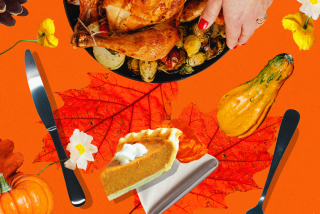What’s in a Name? : A rose by any other name would smell as sweet. But perhaps naming our dreams helps them to come true.
- Share via
I was the first and now I am the last remaining Nayo. My daughter, who married July 1, is calling herself by her husband’s name.
We used to constitute the entire Nayo clan, having adopted that name in the 1970s, while living in San Francisco. It was an exploratory period for my generation. Women were taking their mothers’ maiden names as family names; African Americans were assuming names that reflected their sense of what ancestors would have been named, but for slavery. Nayo has its origins in the Yoruba language of West Africa. It means “we have joy” or “we have happiness.” We came by that name because I believed that instilling in my child a definitive sense of self was paramount--after hugging. When she was 7, Kelley wondered why our last name was the same as that of her maternal grandparents. She pointed out that her cousins, my sister’s children, had a different last name. Well, I told her, we aren’t married to anyone, so we don’t have somebody else’s last name. Kelley suggested that we get married. I pointed out that marriage would mean she would have to share my attention and time. Never anybody’s fool, Kelley came up with a solution: We could marry each other, bypass that sharing thing and thus acquire a married name.
Some days later, I was paging through a book of African names that a friend had used to name her son, my godson. I discovered “Ayo,” a root meaning “joy” or “happiness,” and all its permutations, including Nayo. I liked the fact that the name told Kelley something important about our lives. Whatever may be materially lacking, an important element of being a family exists in that name. The name could remind us, even at the worst moments, there had been happiness before and there could be joy thereafter.
It was not difficult, in 1975 in California, to change your name. As long as you were consistent and did not intend to defraud creditors, I was told, you could call yourself Minnie Mouse. Since my objective was to create a sense of belonging for a child I cherished, I told both my creditors, changed my driver’s license and my daughter’s school records, got new checks printed and went from Lydia Anne Fields to Lydia Anne Nayo.
Becoming Nayo was more than shrugging off a “slave name.” Taking a name felt more like assuming responsibility for my life. If I could choose a name, I could choose a path, a way to live that countered the negative expectations of those who saw, when they looked at us, an unwed mother and her doomed-to-failure child. Renaming ourselves was an act of affirmation. A kid could live up to a name that asserted that her life was a joyous possibility. People tend to greet us by our whole names, and I have always thought that there was a certain rhythm to a hearty “Hey, LydiaNayo!” It rings, I have been told. Lips often curve into a smile when saying it. I am often asked what Nayo means and how I came to have the name. I enjoy the telling.
But now, I am the last Nayo. As disappointed as I may sometimes be, I respect my daughter’s decision. In Kelley’s experience, naming is making family, and she is making family in her marriage. And while her inquiry 19 years ago was catalyst, I changed our name for me as well. I am a member of a generation that believed that by taking names that expressed our sense of ourselves or our aspirations, we assumed a measure of personal power. Some of our children retained the vestiges of the times in the names we put on their birth certificates. My godson, a child of the ‘70s, became Adikah Cojoe, which means “first child of a second husband, born on a Monday.” He is a visual artist. Could that career choice have something to do with knowing exactly who he is?
Having been this self for nearly 20 years, I am no more Fields than I am white or male. Besides, who knows where Fields came from and what weight it imposed upon the ancestors who carried it? Nor will I hyphenate or take my husband’s last name after all this time. I was pleased to hear him say, early in our marriage, that if the choice were having me in his life calling myself Nayo or not having me in his life, there was no choice.
I have not met another person with the surname Nayo. Not in San Francisco or Oakland or during law school in Washington or in practice in Baltimore or Los Angeles. I check phone books for fellow travelers; I like to imagine that there is a clan of Nayos, choosers of a name with positive meaning. I will stay Nayo, so that clan members will recognize me.
More to Read
Sign up for Essential California
The most important California stories and recommendations in your inbox every morning.
You may occasionally receive promotional content from the Los Angeles Times.













